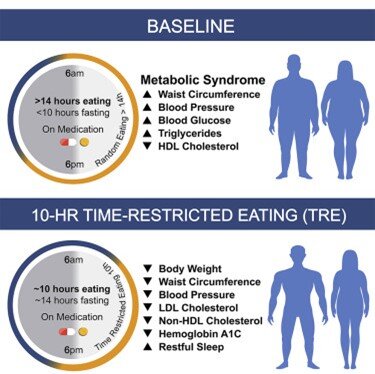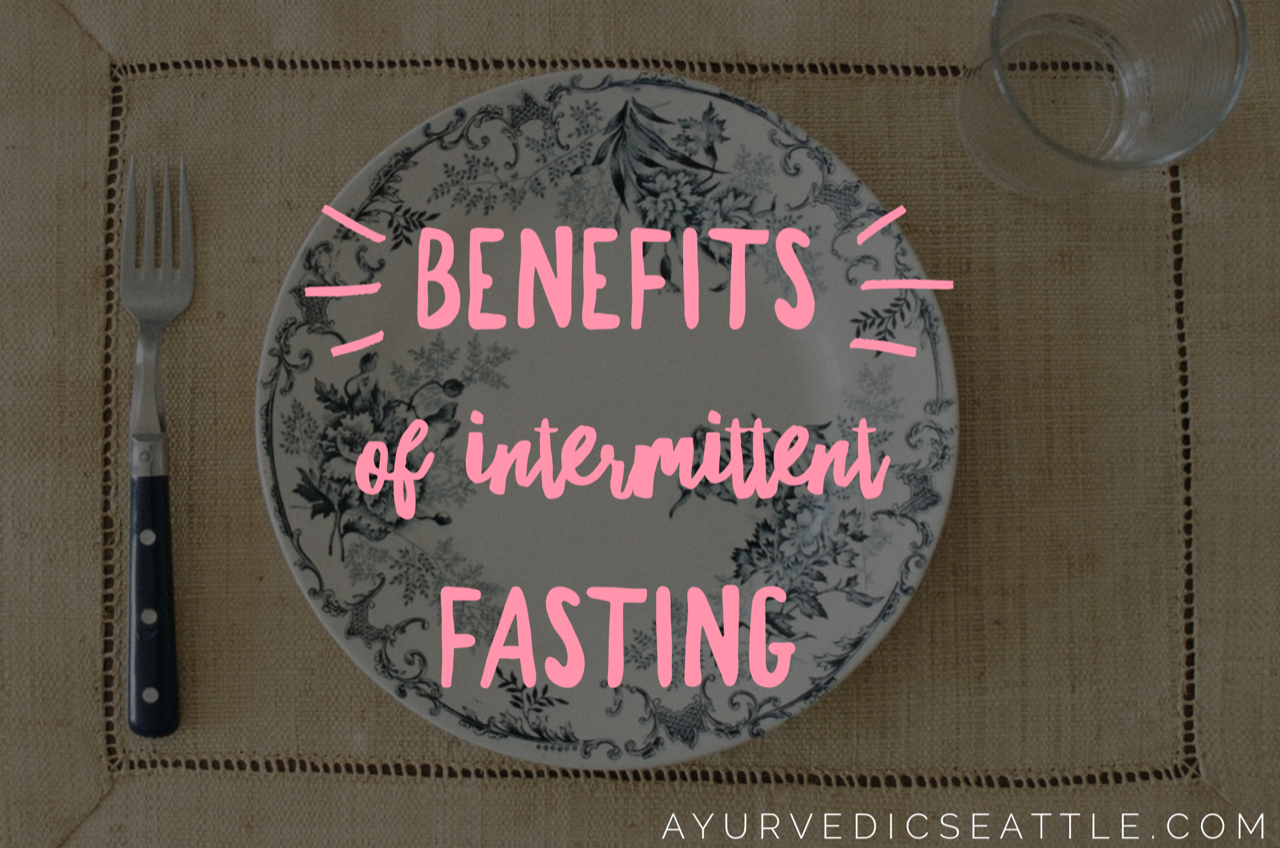Intermittent Fasting for Your Dosha Type
Daily fasting for about 14-18 hours per day is becoming a commonly practiced routine among many clients seen at our practice. As it becomes popularized through various new media and social media sources, its individualized application is neither discussed, nor studied. However, Ayurveda is all about individualization for safe and effective application of this powerful technique.
Benefits of Intermittent Fasting (Source: Reference 2):
Metabolic benefits: During the initial hours after eating, energy is primarily being made from the carbohydrate and protein sources in our diet. As these sources run low, the body switches to ketogenic (fat-based) energy production. Thus, intermittent fasting helps to with improving fatty metabolism for energy production.
Cellular benefits: On a cellular level, fasting has been shown to improve production of antioxidants, improve DNA repair, protein quality control, stimulate mitochondrial health, and reduce inflammation. Thus, it has protective effect on the cellular level.
Overall health and anti-aging benefits: During the fasting period, the bodies organs are found to improve communication, integration, and coordinate function.
Cognitive benefits: Fasting has been shown to improve spatial memory, associative memory, and working memory, as well as learning capacity.

Figure 1: Intermittent fasting improves health in patients with metabolic imbalances. (Source: Reference 1)
Figure one highlights clinical benefits for individuals with metabolism syndrome
Individualizing Fasting by you Dosha Type:
Fasting creates qualities lightness, dryness, heating (improving metabolism), and sharpness.
Vata dominant: Individuals with Vata-dominant constitution or those who have Vata-imbalances, fasting recommendation is typically limited to an overnight fast. A period of up to 14 hours gives a good overnight fast between dinner and breakfast. A regular breakfast, healthy lunch, and lighter well-cooked dinner should be taken by Vata individuals.
Longer fasts are recommended with high levels of toxicity. Indications include sluggish digestion, feeling of tension or tightness in abdomen after eating, bloating, sharp pains in the stomach, weakness after eating excess gas and burping, constipation, etc. Individuals are always given supportive herbs with appetizing, warming, and detoxing to promote digestion and elimination of toxins. Regular fasting practice is limited to 1-2 weeks until digestion becomes stronger.
Fasting must be done sparingly because of the Vata aggravating drying and lightness quality can make an individual experience dizziness, ungroundedness, pain and degenerative changes.
Pitta dominant: Individual with Pitta-dominant constitution or pitta-imbalance, often cannot tolerate fast very well because of the intense (sharp) state of their agni (metabolic system). Still fasting can be applied sparingly to help with digestion of toxins. Similar to Vata-type, a period of up to 14 hours gives a good overnight fast from dinner to breakfast. A regular breakfast, healthy lunch, and light, well-cooked dinner should be taken.
Longer fasts are rarely recommended because of low tolerance for hunger. Individuals with extreme ama (toxicity) experience strong hunger followed by acidity and/or burning pain in the stomach, burning pain with reflux, loose stools, heat and burning sensation in the lower abdomen, etc. Individuals are given herbs with soothing, cooling, alternative (blood cleansing) actions, and corrective effects for metabolic activity.
Fasting in Pitta dominant individuals may not be tolerable. This can be sign of a healthy agni (metabolism) or excessive agni. Therefore, fasting is only done to facilitate digestion of ama (toxins) in the digestive tract and calming inflammatory activity. Vegetable juice-based fasting can be done under supervision for individual with extreme pitta-predominance causing chronic inflammatory pain and swellings in the GI tract, joints, and musculoskeletal system.
Kapha dominant: Individual with a Kapha-dominant constitution or kapha-aggravation, fast is very easily tolerated because of excess dampness and weakness of agni (metabolic) function. Individuals can tolerate fasting up 18 hours. However, such prolonged fast should be done for a limited period of time while the dampness is eliminated and agni is strengthened. As these functions are established through treatment, Kapha individuals will be able to tolerate a healthy length, 14-16 hours, of overnight fast with ease. Kapha dominant constitutions and kapha aggravated individuals take the most benefit from regular practice of intermittent fasting.
Individuals with kapha and ama (digestive toxins) aggravations experience low hunger, excessive fullness in stomach, heaviness after eating, fatigue and mental fog after eating, often associated with weight gain. The qualities of heaviness, density, cloudiness, sluggishness, etc. are commonly aggravated. Lightness, dryness, warming effect of fasting promotes balance and even energizing effect.
While fasting is implemented clinically, individuals are given herbs that are ama (toxin) digesting. These may include black pepper, ginger, long pepper, haritaki, chitrak, etc. These impart the warming qualities to balance the cold/dampness of kapha dosha. Individuals are recommended tolerable amount of physical activity and breathing exercises to promote movement and warming effect. Together these synergize the lightness, drying, warming, and sharpness qualities of the fast.
Conclusion:
Fasting is powerful home remedy. It has very different effects on individuals depending on the constitution and imbalance of the doshas. For health benefit, fasting is only applied to get benefit of reducing ama (toxins) of improper metabolism or it is used keep balance in the kapha constitution. Additionally, there are also traditional and religious practices of fasting. Ayurveda emphasizes that improper suppression of natural urges like hunger can cause vata imbalance or regulatory problems with digestion. So, it is important to apply fasting based on individual capacity.
Reference:
Wilkinson MJ, et al. “Ten-Hour Time-Restricted Eating Reduces Weight, Blood Pressure, and Atherogenic Lipids in Patients with Metabolic Syndrome.” Clinical and Translational Reports, VOLUME 31, ISSUE 1, P92-104.E5, JANUARY 07, 2020.
De Cabo R and Mattson MP. “Effects of Intermittent Fasting on Health, Aging, and Disease.” N Engl J Med 2019; 381:2541-2551, DOI: 10.1056/NEJMra1905136, Dec. 26, 2019.




